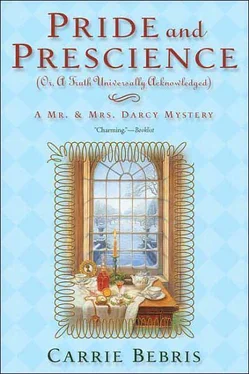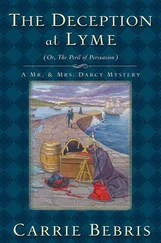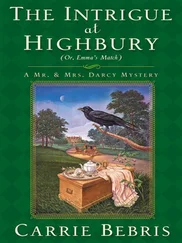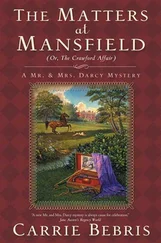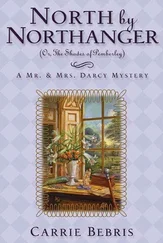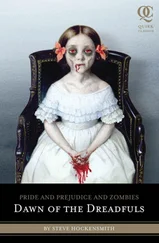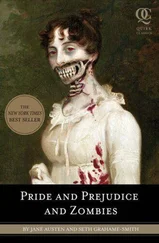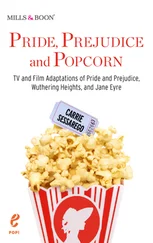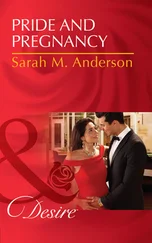“She won’t talk to Charles or Mrs. Hurst about it. Only Mr. Parrish. Who can blame her? How mortifying to have so many people know that one’s nerves have frayed to the point of — to… to that point. It feels indecent even for you and I to discuss it between ourselves.”
“Well, someone ought to discuss it, if we are to learn what really happened.” Since the family council at the Parrish townhouse, no one had said a word about the suicide attempt. The subject was like an elephant in the middle of the parlor; its presence dominated the room but nobody would acknowledge it.
Jane regarded her quizzically. “What do you mean?”
“Has Caroline ever impressed you as a woman with fragile nerves?”
“No. Quite the opposite. But I suppose anyone’s inner fortitude can fail under stressful circumstances.”
“Yes — circumstances like the death of someone close, or the loss of a family fortune, or some other calamity. But marrying a kind, handsome, rich man at a wedding designed to be the social event of the season? Unless her nerves broke because all her dreams have been realized and she has nothing left to which to aspire, I fail to see a convincing cause for such an extreme action as attempting to take her own life.”
“But she was holding the knife when their cook found her in the kitchen.”
“All the more reason to question. Would she choose such a painful, violent method of death? Or one so untidy? She would be too conscious of the fact that her body would be found in a stained gown. And to perform the act in the kitchen? I doubt Caroline Bingley Parrish had ever entered a kitchen before in her life. Would she end her existence in one? In a place where she would be discovered not by her husband or even her lady’s maid, but one of the lower servants?”
Jane stopped and looked her full in the face. “What are you saying, Lizzy? That both the constable and the surgeon are wrong?”
She had no real answer for Jane. What was she saying, after all? Only that the explanations they’d been offered seemed too facile given Caroline’s character and her own half-realized perceptions. But of what value were indistinct apprehensions?
“I don’t know. Just that it’s all very puzzling.” The sound of horses drew her attention toward the house. A familiar carriage approached the front gate.
“Lizzy! Jane!” cried the well-known voice from within. “I came as soon as I heard you were here!”
Elizabeth sighed. There would be no enticing Caroline Parrish out of her chamber today. She and Jane fixed smiles on their faces and went to meet the latest arrival.
“Mama!”
“Now, Lizzy, explain this to me again. Why are you and Mr. Darcy not at Pemberley?”
Elizabeth shifted in her chair, unwilling to lie to her mother outright but unable to prevaricate much longer in the interest of saving Caroline Parrish from becoming the subject of what would surely develop into the most rapidly circulating local gossip since Lydia’s elopement. Why she cared about Caroline’s reputation in the neighborhood, she couldn’t say; the new Mrs. Parrish certainly didn’t deserve protection among people she’d openly disdained time and again. Perhaps Elizabeth shielded her for Jane and Bingley’s sake. Or Mr. Parrish’s. She met the gaze of the latter gentleman across the drawing room, where he sat between the Hursts and Professor Randolph. His eyes pleaded for discretion.
Darcy, apparently sensing her discomfort, intervened. “Coming here was my idea. Elizabeth and I will be off to Pemberley soon enough. My sister, in fact, waits for us there.”
“Oh, I see.” Mrs. Bennet nodded knowingly. “Of course.” Darcy’s statement had clarified nothing, but her mother held him in such awe that she either didn’t notice or didn’t dare voice the question a fourth time. “Well, I’m sure you will be quite comfortable here. Netherfield may not be as grand as your own estate, but it is a fine house. And Jane, you are now mistress of it! I’m so happy for you, darling — mistress of Netherfield! What a fine situation for my daughter!”
Jane smiled self-consciously, clearly embarrassed by her mother’s effusions before her new family. “Yes, Mama. But we won’t be here forever, remember.”
“I know, I know. But that will be still better — an estate of your own! Mr. Bingley, when are you going to stop sitting on your inheritance and purchase a home for my daughter to live in?”
“Quite soon, madam. As soon as we find one we like well enough.”
“The Gouldings just quit Haye Park. How perfect that would be, Jane — having you continue to live so close! And in such a large house! You would need a steward for certain. Pemberley has a steward, does it not, Mr. Darcy?”
“It does.”
“Mr. Bingley, you must promise to hire a steward for your new estate.”
“If it’s big enough to warrant one, I will.”
“Then you must buy one big enough. You can afford it on your income.”
Louisa Hurst muffled a snicker and scanned the room for someone to temporarily fill Caroline’s place in the catty coterie they formed whenever Mrs. Bennet was present. Finding no one to share her amusement, she had to settle for playing with her bracelets to demonstrate her superiority above the older woman’s conversation. Mr. Hurst, apparently bored, rose and headed for the sherry decanter.
Mr. Parrish, however, was all politeness, listening to Mrs. Bennet with either real or well-feigned interest. “Why, Charles, I thought your talk of purchasing an estate was just a longcherished dream, not something you intended to act upon presently,” Parrish said. “Perhaps we should tour some prospects together… once other affairs are settled. Mrs. Bennet, do keep us informed of other houses that become available. Your knowledge on these matters can aid our search tremendously.”
Mrs. Bennet glowed at the compliment. “I will indeed, sir. One hears of so many country houses changing hands these days. It’s a sad business — all these reckless gentlemen losing their fortunes by gambling.”
The rattle of the sherry decanter drew Elizabeth’s notice away from her mother’s penetrating social insights. Mr. Hurst had dropped the stopper on the floor. As he stooped to pick it up, his hand shook. She observed him with disgust. Were he not a gentleman, he would be considered a drunkard.
Her mother continued her discourse unabated. “I’m so glad my three married daughters have sensible, respectable husbands. Well, Lydia’s husband, Wickham, was perhaps a bit wild before their marriage. But such an agreeable young man, and so handsome! He’s in the militia, you know, up in Newcastle, so I haven’t seen my Lydia for months now. Lizzy, you should invite them to visit you when you get to Derbyshire.”
Elizabeth didn’t know which topic of her mother’s conversation was more indecorous: the references to Bingley’s income or the praise of Lydia’s scapegrace spouse. To relieve her own humiliation, she changed the subject entirely. “I believe Papa aspires to come peruse Pemberley’s library. How is my father?”
“Oh, the same as ever. I tried to persuade him to come with me today but he would be obstinate and refuse. Said I should give you a few hours at least to get settled before calling. The very idea! That your own mother should have to stand on ceremony when it comes to waiting upon her daughters. He says such things just to vex me, I’m certain. What that man does to my poor nerves! So you and Jane will have to come to Longbourn tomorrow to see your father if you don’t want to wait for him to get round to calling here. Bring your husbands, and we’ll have a family dinner. Oh — I suppose we’re all family now, aren’t we? Why don’t you all come? Mrs. Parrish, too. Where is she, by the way? I want to wish her joy.”
Читать дальше
